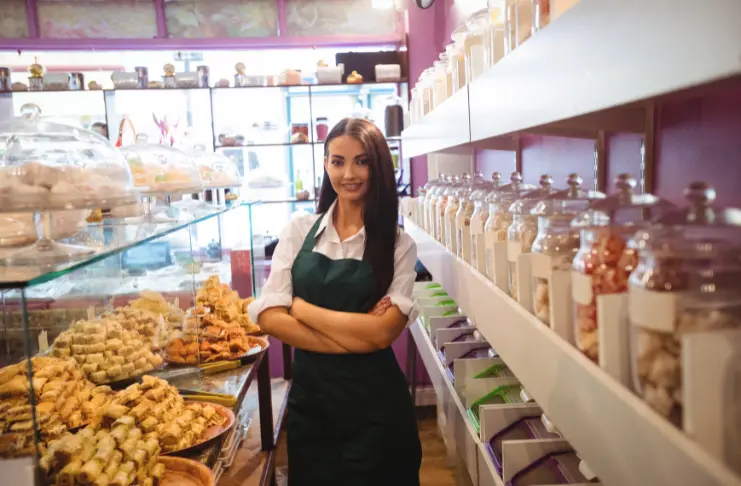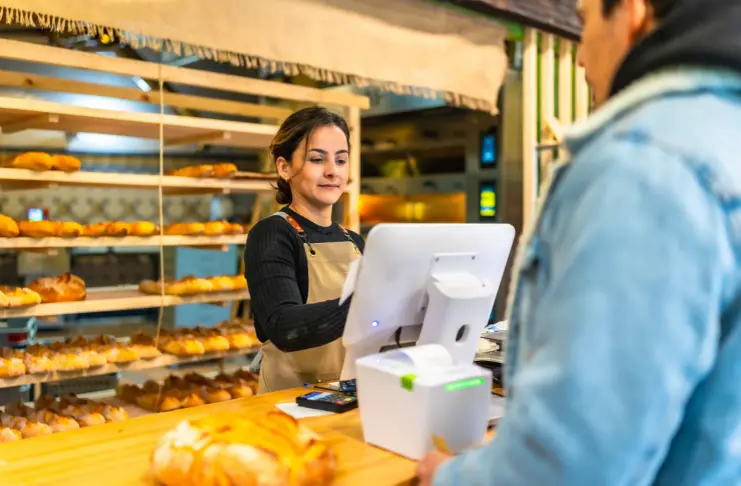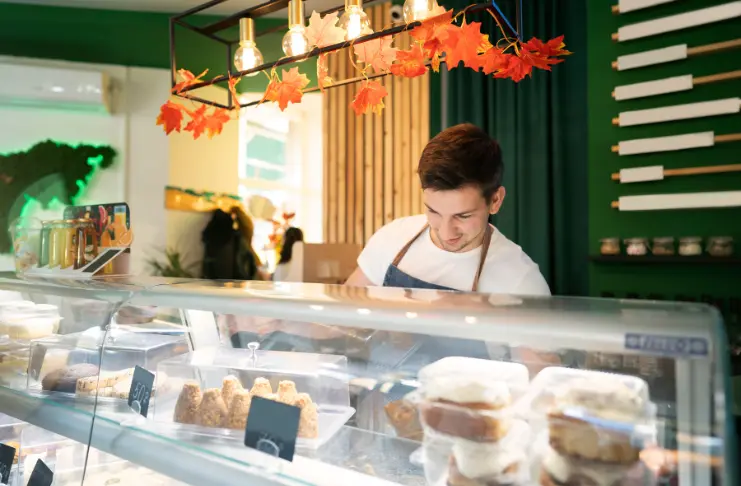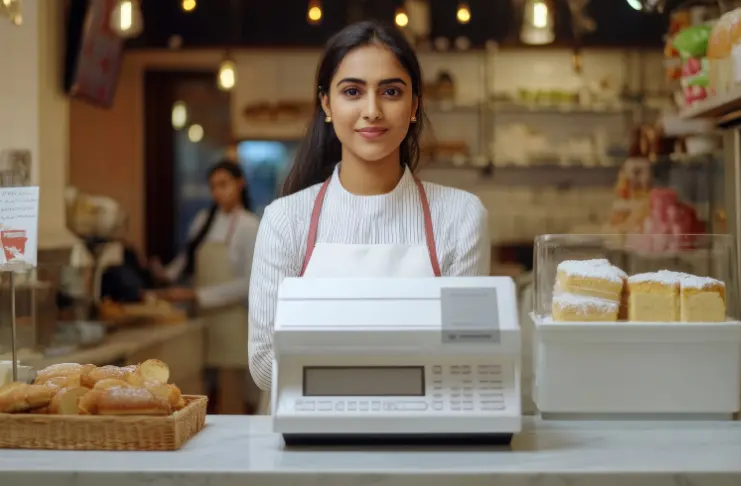
From home kitchens to bustling storefronts, bakeries are fast becoming one of the most accessible food ventures in India. The appeal is simple: lower startup costs compared to full-scale restaurants, high demand for quality baked goods, and the ability to scale from local to digital with relative ease.
But while the opportunity is clear, the investment required can be a bit challenging to navigate. Should you invest in a commercial oven upfront? How much should you allocate for interiors, licenses, or packaging? And is it possible to start small without compromising on service?
This blog offers a detailed analysis of the small bakery investment costs in India across formats and elements.
Bakery Business Model in India: Formats and Startup Cost Comparison
India’s bakery industry is no longer limited to traditional sweet shops or large commercial units. With rising disposable incomes, shifting customer preferences, and increased demand for fresh, customized bakes, the segment has diversified into flexible formats suitable for different investment levels.
The Indian bakery sector is estimated at $13.8 billion in 2024, with projections to reach $31.5 billion by 2033 at a CAGR of 9.12%. This growth is primarily driven by
- Growth of online food delivery platforms
- Social media visibility
- Increased interest in health-conscious, eggless, and gluten-free baked goods
- Lower barriers to entry with equipment financing and cloud kitchens
As a result, many bakery businesses are entering the market across the following formats-
1. Home Bakery
A home-based bakery venture is the most accessible and low-investment model, ideal for solo entrepreneurs or hobby bakers. It can start from a home kitchen with basic baking equipment, operate under a home-based FSSAI license, and take orders via Instagram, WhatsApp, or food delivery platforms.
Estimated startup cost: Rs. 50,000 to 2 lakhs
2. Cloud Bakery
This format operates out of a commercial kitchen without a storefront. You can fulfill orders exclusively via delivery platforms like Swiggy/Zomato or the bakery’s website. It requires commercial-grade equipment and packaging, but saves significantly on rent and interiors.
Estimated startup cost: Rs. 15 to 20 lakhs
3. Takeaway/Counter Service Bakery
A compact format with a physical presence but no seating. Customers walk in, browse the display counter, and take away ready-to-eat or pre-ordered items. It demands decent branding and location visibility but avoids the overheads of full dine-in setups.
Estimated startup cost: Rs. 25 to 30 lakhs

4. Bakery Cafes
A full-fledged retail model with indoor seating, display counters, and an expanded menu (bakes, beverages, light meals). While this format offers higher customer engagement and branding, it also involves the largest investment in interiors, staff, and compliance.
Estimated startup cost: Rs. 30 to 35 lakhs
5. Specialty Bakery
These bakeries focus on a specific product, niche, or dietary segment, such as vegan, gluten-free, keto, sugar-free, or gourmet French-style bakes. They often require unique ingredients, specialized techniques, and strong branding to stand out.
Estimated startup cost: Rs. 35 to 40 lakhs
6. Bakery Catering
Rather than selling directly to individual consumers, this model focuses on large orders for events, festivals, corporate clients, or other food businesses. It often functions from a rented kitchen space with efficient production workflows.
Estimated startup cost: Rs. 30 to 35 lakhs
7. Franchise Bakery
This format allows you to operate under an established brand by paying a franchise fee. Setting up a franchise bakery involves a fixed design layout, approved suppliers, POS systems, and staff training, as defined by the parent company.
Estimated startup cost: Rs. 50 to 55 lakhs
INDUSTRY INSIGHT
The Indian bakery market was valued at $13.8 billion in 2024 and is expected to reach $31.5 billion by 2033, growing at a 9.1% CAGR. Within this, the organized bakery retailing segment is growing faster than the unorganized, with a projected 10.9% CAGR through 2030, driven by rising disposable income, urbanization, and the growth of online delivery platforms. |
Small Bakery Investment Cost in India: Initial Set Up Costs
While coming up with a bakery business plan may seem simpler than a full-service restaurant, the initial setup still requires careful budgeting. From location and interiors to compliance and baking equipment, every cost component plays a role in your budgeting.
Here is a breakdown of small bakery setup cost in India, covering the essential one-time investments involved-
A. Location and Interior Setup
Your store is one of the biggest and most important costs. The cost here depends heavily on the city, foot traffic, and size of the unit.
For instance, a store space of 500-1000 sq ft is ideal for a small bakery with a kitchen and dining area, where the rent generally ranges between Rs. 60,000 and Rs. 70,000. In addition to the rent, the interior setup costs include-
- Kitchen countertops and storage
- Prep areas, washing, display, and billing
- Basic renovation, like wall color and lighting
- Repairs
- Furniture, display cases, decor, and accessories
- Practical finishes like washable wall panels and non-slip floors
- Customer-facing elements like menu boards, signage, and counters
Overall, you can expect to spend between Rs. 5-12 lakhs on rent deposits, monthly rent (first month), and interiors.
B. Bakery Equipment
Your equipment setup defines how much you can produce, how quickly, and how consistently. Many new bakers make the mistake of starting with home-grade appliances, only to realize they can’t handle order volumes or commercial reliability.
Instead, you’ll want to invest in-
- A deck oven or commercial OTG
- A planetary mixer, essential for consistent doughs, batters, and frostings
- Refrigeration and freezing units
- Display chillers
- Tools like racks, trolleys, baking tins, and proofing baskets
- Crockery and utensils
Kitchen equipment typically requires you to spend Rs. 3-5 lakhs, depending on brand, size, and product range.

C. Tech Infrastructure
Even if you’re running a small bakery, having a simple digital infrastructure pays off in the long run; manual billing and handwritten order tracking can quickly become chaotic, even more so if you’re offering custom cakes or festive gift boxes.
Your basic tech setup might include a POS billing system that manages orders and payments, integrated inventory management software, and optional tools for order scheduling or customer feedback. Further, you may also want to create a website or online menu, especially if you want to offer pickup, pre-orders, or local delivery.
D. Licensing and Registration Costs
Regardless of your bakery format (even a home-based cloud bakery), you’re legally required to register with FSSAI and local authorities. Here’s what most small bakeries need-
- FSSAI license
- Shop and Establishment registration
- GST registration
- Fire safety clearance
- Health license from the local Municipal Corporation
Obtaining these licenses is necessary to ensure compliance and avoid penalties or business closure. You can apply for relevant licenses online via government portals or through consultants. Depending on your location and format, licensing and registration costs can be around Rs. 10,000 to 50,000.
Bakery Investment Cost in India: Operational Costs
Once your bakery is up and running, the costs change. Recurring expenses can quickly eat into margins if not managed carefully, especially in high-churn formats like takeaway counters or delivery-focused units.
Let’s break down the key monthly expenses you must account for when planning your small bakery business costs in India.
A. Raw Material and Packaging
Depending on your product range—breads, cakes, cookies, or desserts—your inventory will include flour, dairy, eggs, yeast, chocolate, nuts, and flavoring agents. Since prices fluctuate based on market rates and seasonality, most bakeries keep a weekly procurement cycle to maintain freshness and manage wastage.
Plus, with rising demand for takeaway and gifting options, attractive and food-safe packaging is crucial to building brand appeal. This includes boxes, labels, liners, stickers, and tamper-proof seals. This can bring your estimated monthly cost to Rs. 50,000 to Rs. 1 lakh, depending on volume and SKUs.
B. Staff Salaries
Even a small bakery needs a reliable team for smoother operations. At the minimum, you’ll need to hire-
- 1-2 bakers or helpers for daily production
- A cashier or counter staff (for retail formats)
- Optional part-time staff for cleaning, delivery, or packing
Basic pay for bakers, helpers, and front-line staff can range from Rs. 10,000 to 25,000 for each employee per month.

C. Utilities and Maintenance
Commercial ovens and refrigerators consume significant power. When you add water bill, gas cylinders, AC, lighting, pest control, and basic equipment upkeep, the monthly costs add up. On average, monthly utility expenses can range between Rs. 8,000 and Rs. 15,000, depending on equipment load and operating hours.
D. Marketing and Aggregator Commissions
In today’s competitive bakery landscape, strong digital visibility can make a significant difference in ensuring success. Monthly marketing costs often include running paid ads on platforms like Instagram and Facebook, collaborating with local influencers through barter deals, and offering discounts to boost visibility on food delivery apps.
If you’re listed on aggregator platforms, you will also need to pay a commission of around 15-25% per order, based on the platform and location. Depending on your marketing strategy and volume of online orders, monthly promotional expenses may vary.
Budgeting Tips for First-Time Bakery Owners
If you’re launching a bakery for the first time, smart budgeting can make all the difference in the financial standing of the business. Here are some bakery budgeting tips when getting started-
- Start small: Consider operating from home or a small cloud kitchen format to test demand before committing to a physical storefront.
- Rent: Instead of opening a bakery at a premium commercial spot, look at semi-commercial zones or residential markets with high foot traffic and lower rent.
- Save on equipment: Buying refurbished mixers, ovens, and chillers, or leasing basic equipment, can help reduce upfront investment by 30-50%.
- Plan contingency fund: Always keep at least 3 months of working capital aside for raw materials, salaries, and rent. It works as a safety net during slow months.
- Rely on free marketing: Instagram reels, customer referrals, Google My Business reviews, and WhatsApp menus are excellent ways to market your bakery to a wide customer group.
Conclusion
Opening a small bakery in India in 2025 can be a rewarding business if planned with clarity. From understanding one-time bakery setup costs in India to managing monthly expenses, every detail is critical for building a stable foundation.
The key is to start with a format that matches your budget and goals, stay flexible in your approach, and make the most of low-cost tools and smart location choices.
Frequently Asked Questions
Starting a small bakery in India typically costs between Rs. 50,000 and Rs. 15 lakhs, depending on format, location, and equipment choices.
Ownership cost of a small bakery includes an initial investment of Rs. 5-15 lakhs and monthly operating expenses of Rs. 80,000-Rs. 2 lakhs.
Profit margins for a bakery business in India range from 20-40% depending on scale, pricing, and waste control.
Yes, small bakeries can be profitable if overheads are managed well. Home-based or cloud bakery formats often see better margins due to lower rent, staff, and utility costs.
Setting up a functional small bakery with basic interiors, kitchen setup, and compliance costs around Rs. 5-15 lakhs. However, these costs can go higher if you choose premium equipment or high-footfall locations.
The minimum you need to start a small bakery business (home-based or takeaway) is around Rs. 50,000-10 lakhs. This includes basic kitchen equipment, ingredients, permits, and a simple marketing push.
On average, bakery setup costs in India range between Rs. 5-40 lakhs, depending on format (takeaway, dine-in, cloud), with rent and equipment being the major cost drivers.
Bakery setup includes one-time costs like interiors, kitchen equipment, licenses, and tech, which typically cost between Rs. 5-40 lakhs.
Yes, a bakery business in India is highly profitable, especially in urban and Tier 2 markets. High-margin bakery products like pastries and cakes can deliver solid margins.
Essential bakery equipment costs Rs. 3-5 lakhs, depending on whether items are new or second-hand. This includes ovens, mixers, chillers, and display counters.
Initial startup costs for a bakery in India are around Rs. 5 to Rs. 40 lakhs, including setup, licenses, equipment, and branding.
You’ll typically need Rs. 5-40 lakhs, depending on your business model and location.
Opening a bakery in India typically costs between Rs. 5 to Rs. 40 lakhs, covering expenses like rent, interior setup, kitchen equipment, and licenses.








